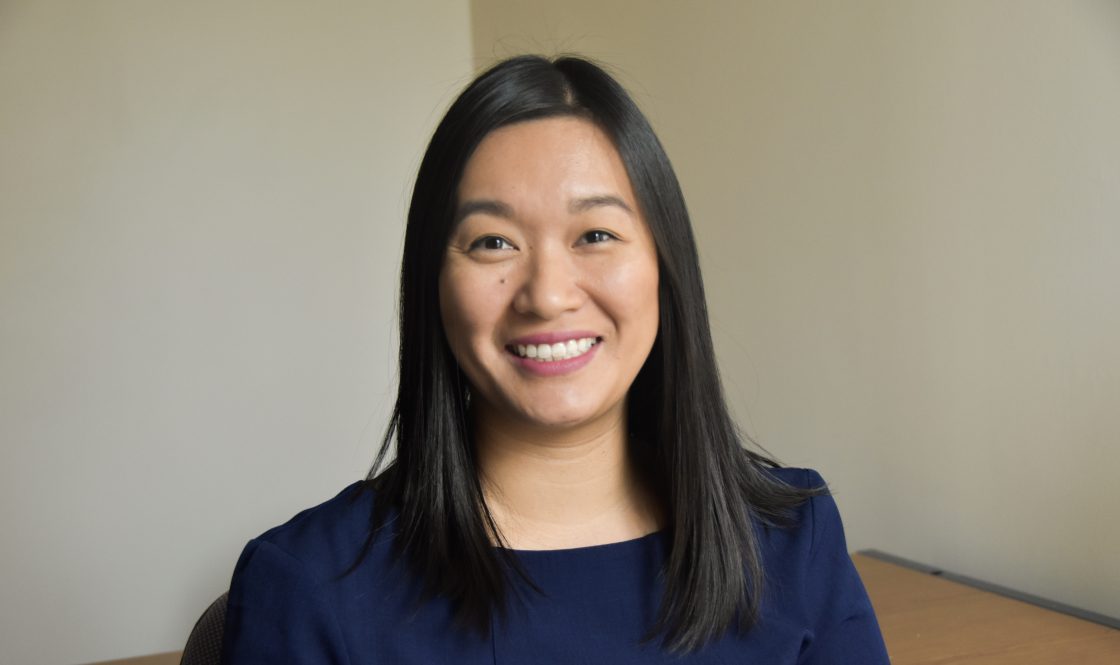Jacqueline Chen sees her research in social psychology as a means of giving voice to the experiences of people who belong to marginalized groups.
As an undergraduate at Pomona College in California, Chen was interested in math and how it was guided by logic that could be demonstrated through proofs. But a social psychology class allowed Chen to take her love of math in a new direction.
In that class, Chen learned about experimental social psychology through classic examples like a study demonstrating how an applicant’s race influences a prospective employer’s evaluation of them as a candidate.
“I thought: ‘It’s just like a proof in math,’ because you can isolate one variable (in this case, the applicant’s race) and change it and show there’s a big difference and downstream consequences,” Chen says. “I really fell in love with the experimental methods of social psychology coupled with the obvious social justice implications for the research.”
Asking a New Question
Chen’s research career launched when she asked a seemingly obvious question as a graduate student at the University of California, Santa Barbara.
Much existing social science research has looked at how we form impressions of other people. This process involves people using visual categories to make assumptions about a person. These categories can include things like age, race, or gender. But these categories are not always clear.
“I was thinking about the people I knew in college, I was thinking about my cousins who are Multiracial and I was like ‘well what about people whose race you can’t tell from their appearance?’” Chen says.
I was thinking about the people I knew in college, I was thinking about my cousins who are Multiracial and I was like ‘well what about people whose race you can’t tell from their appearance?’ — Jacqueline Chen
This question had hardly been considered by researchers, if at all. Chen’s research has focused on how monoracial people perceive Multiracial people, defined as those who identify as having more than one racial background.
Chen is focused on understanding Multiracial people’s experiences with interpersonal barriers and microaggressions that may arise due to monoracial people’s social perceptions. For example, the consequences of others constantly asking Multiracial people, “What are you?”
“Many people now are more interested in the topic, realizing we have a gap in our knowledge because there were assumptions made that people always fit cleanly into one racial category,” Chen says. “And the assumptions are also carried through in our thinking about gender and how we think about people who are gender-ambiguous.”
Seven years ago, Chen started a massive collaborative project to increase the amount of data available for studies with Multiracial people now known as the American Multiracial Faces Database while working as a faculty member at UC Irvine.
Many social psychology studies work by showing participants different faces and having them respond to them under the parameters the study is using. The issue is that, prior to Chen’s project, there were very few widely available photos of Multiracial people who had consented to having their image used for psychological research.
Researchers had been attempting to use computer-generated photos. But these faces never look exactly like real people. Furthermore, of the few available photos, most were Black-White Biracial people, excluding those from other backgrounds.
“Black-White Biracials…are a huge Multiracial group, but definitely not the only one, and certainly not the only one in California,” Chen says. “I wanted to get a diverse set of Multiracial people.”
The database formally launched in summer 2019. It contains 120 faces and has been downloaded by more than 300 researchers so far.
Chen says one of the most common misconceptions about her work is that its primary goal is to identify individuals as biased.
“When people hear about my research interests, they think I’m trying to find out who’s racist, or who’s sexist and call them out on it,” Chen says. “And that is not the purpose of any of my research.”
Instead, Chen’s work focuses on documenting when and why implicit biases exist on a group level and how to reduce their impacts.
Developing Inclusive Mentorship
Now an assistant professor of social psychology in the UConn Department of Psychological Sciences in the College of Liberal Arts and Sciences, Chen’s research has turned to studying mentorship in graduate STEM programs through a recently awarded NSF CAREER Grant.
“Our college is strongly invested in diversity science,” Chen says. “I was really impressed by the investment and effort that they made to really broaden faculty diversity and reach out to researchers who are interested in these topics.”
Chen is interested in understanding how STEM doctoral students, specifically students from gender and racial minority groups, can thrive and how faculty mentors can support them.
“All the time in academia we talk about diversifying the pipeline, diversifying academia, by getting more underrepresented students in your program, because as you move from undergrad to grad to post doc to assistant professor, you gradually see almost no minorities,” Chen says. “It gets more and more homogenous.”
Graduate students across the board are at a high risk for mental health issues such as depression, burnout, and suicide. This risk is even more significant for students from underrepresented groups.
“For an underrepresented minority, it can be very difficult to maintain motivation and engagement if people are constantly questioning your competence, questioning whether you belong in the field, acting like you don’t have the potential to succeed, or not offering support,” Chen says.
Chen is currently collecting data from students and faculty, particularly women of color.
Chen plans to develop a self-paced training module to help faculty who are interested in becoming better mentors through an evidence-based theory of inclusive mentorship.
Chen says one preliminary finding from her project is that mentors and peers can help students celebrate personal victories to help prevent the erosion of students’ motivation to stay in the field.
Chen says clear communication and using tools like social media help her findings reach out of the academia bubble into the world.
“In our heads, when we’re talking within our fields, professors use a lot of jargon and we aren’t very good at communicating what our results are or what it means,” Chen says. “You constantly need to be able to translate what you found to something that’s more digestible to the public.”
As a professor, many of the students who approach Chen are from diverse backgrounds themselves.
“I find this very rewarding, that something about our research is speaking to them and of interest to them it highlights the need to diversify our literature,” Chen says.
For Chen, mentorship also highlights how conversations with students can spark new avenues for research.
“It’s so cool that just talking to people can inspire your research in a different direction than you thought you would go, something you never would have thought on your own,” Chen says. “And that’s important to acknowledge.”
A few decades ago, many in the psychology field did not acknowledge the importance of the kind of research Chen does, a mentality that is, thankfully, changing.
“I hope to keep conducting research on these topics, to be a resource in other UConn faculty who might be interested in studying these topics, to have an open door to students who want to work with me, and that my field will become increasingly receptive to the importance of these topics,” Chen says.



